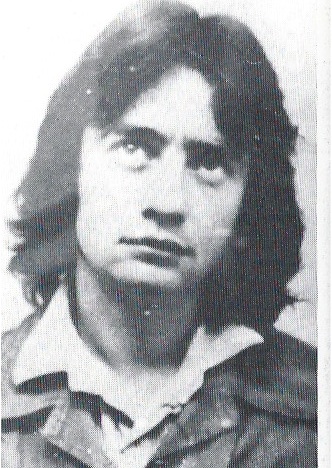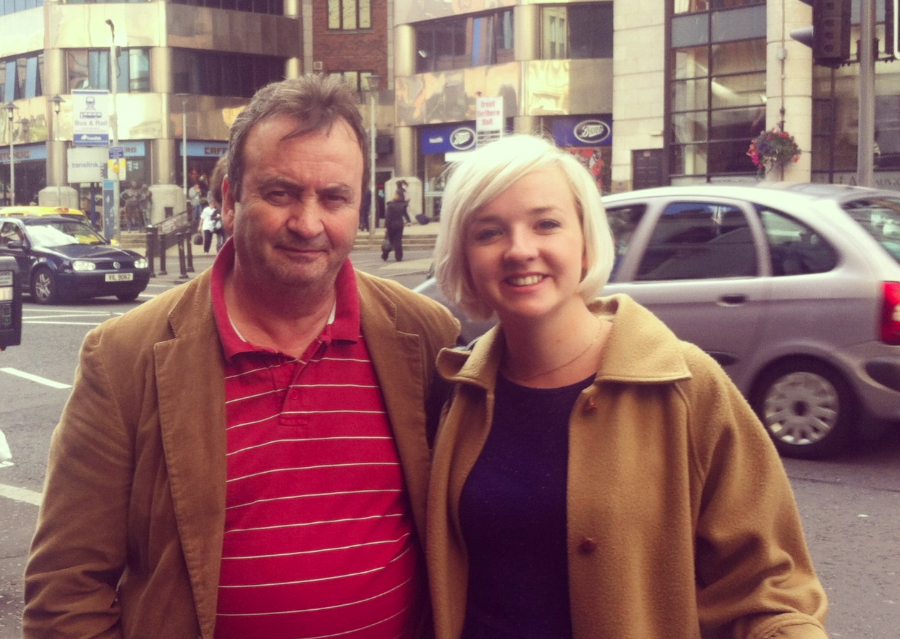 ‘I remember the night before I got out, looking up at the sky through the bars at Brixton prison and crying,’ says Gerry Conlon, as he sips a Diet Coke in a quiet pub in Belfast’s city centre. ‘Not crying with joy, but crying with anticipation of what lay ahead of me…because this had become my home.’
‘I remember the night before I got out, looking up at the sky through the bars at Brixton prison and crying,’ says Gerry Conlon, as he sips a Diet Coke in a quiet pub in Belfast’s city centre. ‘Not crying with joy, but crying with anticipation of what lay ahead of me…because this had become my home.’
Gerry Conlon is talking to Mary-Rachel McCabe.
Gerry Conlon was released from prison on 19th October 1989 after serving 15 years as an innocent man. In November 1974, the then 20-year-old was arrested in Belfast for his supposed part in the IRA pub bombings in Guildford, which killed five people and injured 65. Conlon had never been to Guildford. But along with three others – who became known as the Guildford Four – he was sentenced to life in prison on the basis of confessions obtained under torture by Surrey police.
Conlon’s father, Giuseppe was also arrested and charged in connection with the bombings after he travelled to England to organise legal representation for his son. Giuseppe Conlon, along with Conlon’s aunt, Annie Maguire, her husband Paddy and their family – who became known as the Maguire Seven – were convicted on the basis of dubious forensic evidence which the prosecution claimed proved they had handled explosives used in the bombings. Giuseppe Conlon was sentenced to 12 years’ imprisonment and died in prison less than five years into his sentence. The forensic evidence used to secure his conviction was later exposed as fraudulent.
The Guildford Four and the Maguire Seven, together with the Birmingham Six, continue to be viewed as three of the most deplorable miscarriages of justice in British history.
Life behind bars
Almost 40 years on, Conlon, now 59, remains baffled by the logic of those who arrested him in his own home on 30th November 1974: ‘If I had had any involvement, knowing that Paul Hill [another member of the Guildford Four] had been arrested, I would have just gone over the border – the Free State government wasn’t extraditing anybody to England then. The stupidest thing in the world would have been to stay in my own home.’ Conlon thought at the time that he had been arrested for stealing – ‘I was a thief. I couldn’t keep my hands to myself’ – and therefore couldn’t understand why it was soldiers who brought him to Springfield Road police station, in the back of an Army Personnel Carrier. ‘They had me on the floor and they were stamping on me, and kicking me,’ he says. ‘One put a cigarette out on the back of my neck.’
Conlon went on to spend 15 years behind bars, being moved between English prisons 22 times. He spent five and a half years in solitary confinement. ‘Not consecutively’, he hastens to add, ‘ten months in solitary was the longest.’ How do you pass five and a half years in solitary confinement? ‘I don’t know. I used to walk up and down the cell and count how many feet it measured over and over again. And when any light came through from the sunshine I would count the bricks on the wall.’
Outside of solitary, the prison guards would defecate or put glass in Conlon’s food. They encouraged other prisoners to ‘stab and scald’ him. Once the guards took him into a solitary cell, threw him on the ground face-down and injected him with paraldehyde – a paralysis-inducing drug – leaving him lying in the cell for three days. Conlon recites the catalogue of sights that he witnessed in prison in an almost prosaic tone:
‘I saw two people murdered. In front of me. I witnessed herds of people being raped. Gang raped. People self-harming. People eating razors and glass.’
I wonder how he is not more damaged. ‘I am,’ he says. ‘You’ve just caught me on a good day.’

After his father Giuseppe died in prison in January 1980, things deteriorated even further for Conlon. ‘I couldn’t deal with the bitterness,’ he says. ‘Watching your father die in jail is one of the most bizarre things that could ever happen in your life.’ Conlon wasn’t allowed out of prison to attend his father’s funeral, nor was he allowed to phone home to speak to his grieving mother. ‘I was given one day off work,’ he tells me. Conlon channelled his bitterness into continuing the letter campaign for the Guildford Four that Giuseppe had started when he was still alive: ‘Seeing the strength of character and the enormous amount of dignity and self-respect that he had for himself, and how vocal he was in stating that he was innocent, and standing up for himself in the face of adversity, was what gave me strength after his death to carry on.’
After losing their first appeal in 1977 – despite the emergence of detailed confessions from the real perpetrators of the IRA bombing in Guildford – Conlon had given up on the British legal system, and lost all faith in his lawyers. But in November 1986, Sister Sarah Clarke – a prominent member of the Guildford Four campaign for justice – wrote to him in prison, suggesting he meet the now prominent human rights solicitor, Gareth Peirce. Conlon was adamant not to seek assistance from another British lawyer: ‘I wrote back “they’re all corrupt; I don’t trust them. I’ll do it myself. At least then if I fail I can blame myself.”’
But Sister Sarah insisted on the meeting, and eventually Peirce came to see him in Long Lartin prison: ‘At the visit, I went over and there was this woman there. I sat down and she said “you must be Gerry”. We spoke for about twenty minutes. “My job is to get you out and I’m going to get you out,” she said. She just seemed like she really did want to help me.’
Fat cat lawyers
Peirce subsequently visited Conlon in prison frequently and uncovered the crucial alibi evidence which had been suppressed by the police, securing the release of the Guildford Four. ‘Today you couldn’t get that,’ says Conlon, turning to the subject of the legal aid cuts. ‘With the pressure that legal aid lawyers are under… . I’m glad to see that Grayling has changed his mind on PCT [price-competitive-tendering] because that proposal had the potential to create a lot more miscarriages of justice and fundamental wrongs within the judicial system.’
What of the commentators – and politicians – who have labelled Peirce a ‘fat cat lawyer’, who has cornered a ‘war on terror’ market in order to rake in millions of pounds worth of legal aid? Conlon laughs with incredulity. ‘Money?…You must be joking.’ ‘No one in Gareth’s firm earns any money. I’ve seen the lawyers in her firm coming into the office at 8am and leaving at 11pm. They’re not doing it for the money. They’re doing it because they believe in their clients, and because they believe in the British justice system and they want to uphold it.’ 
Institutionalised
After Conlon’s release from prison in 1989, he turned to drugs and alcohol to cope with the outside world. ‘I didn’t know who I was,’ he says. ‘I’d gone from someone that a British judge – and the newspapers – said should be hanged… to becoming accepted and ending up with good friends in prison…good English friends. I’d become institutionalised and I didn’t know it.’
Conlon has since recovered from his drug and alcohol addictions, but he continues to suffer from post-traumatic stress disorder. ‘When I was in prison I never had one nightmare,’ he says, ‘but since I’ve been out, I can’t sleep…My trouble is that I remember everything – and I get flashbacks. I get nightmares.’ He also suffers from a ‘guilt complex’ because ‘my father came to England to help me, but he ended up dying in prison’. Conlon was given no psychological help by the government until 20 years after his release and even then ‘it’s only scratching the surface’, he tells me.‘The government are selective in who they provide trauma treatment for,’ he says. ‘Too many innocent people come out of prison completely institutionalised; they don’t know how to cope.’
‘There are days I wish I was still in prison. There are days I wish I was dead. The only thing that keeps me going is that I believe it is now my calling to stop what happened to me happening to other people. No family should have to suffer what my family suffered.’
In June 2013, Conlon co-founded Justice Watch Ireland, a voluntary-run oversight group set up to investigate potential miscarriages of justice in Ireland. ‘I want to try and help people who are falling into the same situation as me,‘ says Conlon. ‘I want to see reform of the judicial system, so that it’s fairer, more transparent, and more accessible. And I want to see the penal system reformed so that people don’t come out of prison and commit the same crimes over and over again.’
The damage done
Having lived in London for 20 years following his release from prison, Conlon also continues to campaign against miscarriages in England. He is heavily involved in the campaign for Eddie Gilfoyle, who spent 18 years in prison for the supposed murder of his wife and unborn child, despite overwhelming evidence to prove that she committed suicide. ‘Eddie Gilfoyle should never have been in prison,’ says Conlon. Gilfoyle is now deeply depressed, he tells me. ‘He wishes he was back in prison because all his relationships in the outside world are broken… . Of course it will help him if he gets his name cleared, but the damage has already been done. You have to be careful what you wish for as a prisoner – sometimes you can’t cope with what you get.’
Despite the alacrity with which Conlon speaks about his campaigning work, the anger returns whenever the conversation goes back to his own experience. He is angry that he was framed for something he had ‘nothing to do with’ – ‘Gerry Adams would’ve been a far worthier candidate’ – and he is angry that no one has ever been punished for suppressing the evidence which proved the Guildford Four’s innocence. Their case and that of the Birmingham Six are both subject to a 75-year Public Interest Immunity Order, preventing the cases from being reopened until long after the police officers involved ‘have retired on full pensions’, according to Conlon. ‘Who are they protecting under this Public Interest Immunity Order?’ he asks. ‘It’s not us; it’s themselves.’
With so much of his life now dedicated to campaigning for victims of miscarriages of justice, I wonder where Conlon would be today if he hadn’t spent 15 years in prison for something he didn’t do. ‘I would have gone to jail anyway, because I was a thief,’ he tells me nonchalantly. ‘Or, as my mum used to say, the IRA may have shot me.’ Why’s that? ‘Because I was a petty thief and a nuisance,’ he says. ‘And a bad singer.’
This interview was originally published on the Justice Gap in October 2013.




